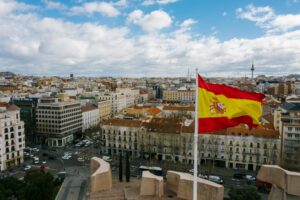Spain’s Non-Lucrative Visa or NLV is the country’s version of an Independent Means Visa, offering residency to individuals who can financially support themselves without working in Spain.
The Independent Means Visa in Spain is especially popular among retirees, digital nomads with passive income, and high-net-worth expats seeking a Mediterranean lifestyle.
This guide covers:
- What are the different Spain immigration options?
- How much money do I need for residency in Spain?
- How do you prove sufficient funds?
- What is the current IPREM in Spain?
- What is the easiest Spanish visa to get?
My contact details are hello@adamfayed.com and WhatsApp +44-7393-450-837 if you have any questions.
The information in this article is for general guidance only. It does not constitute financial, legal, or tax advice, and is not a recommendation or solicitation to invest. Some facts may have changed since the time of writing.

How many types of visas are there in Spain?
Spain offers at least seven main visa types, each tailored to a specific purpose such as tourism, work, study, or investment.
Common categories include:
- Tourist Visa (Schengen short-stay): Allows stays of up to 90 days within a 180-day period for tourism, business, or family visits.
- Student Visa: For non-EU nationals enrolled in an accredited Spanish educational institution; allows stay for the duration of studies.
- Work Visa: Issued to individuals with a job offer in Spain, including both employer-sponsored roles and self-employed professionals.
- Entrepreneur Visa: Designed for those planning to start an innovative business in Spain, subject to government approval.
- Family Reunification Visa: For non-EU family members of legal residents or Spanish citizens to join them in Spain.
- Non-Lucrative Visa (NLV): Often referred to as Spain’s Independent Means Visa, this is for financially self-sufficient individuals who can support themselves without working in Spain.
What is independent means residency in Spain?
Independent means residency refers to legal residency in Spain based on financial self-sufficiency, without the need to work or invest in a business.
This status is granted under the Non-Lucrative Visa (NLV) and is designed for individuals who can demonstrate they have passive income such as from pensions, rental properties, dividends, or savings.
What is the NLV visa in Spain?
The NLV is a type of Spanish residency permit that allows non-EU nationals to reside in Spain long-term without engaging in any professional or economic activity within the country.
While commonly used by retirees, it’s also popular among digital nomads with income sourced from outside Spain.
It is initially granted for one year, and then renewable for two-year periods, leading up to long-term residency after five years.
How do you qualify for NLV in Spain?
Key eligibility criteria include:
- Be a non-EU/EEA/Swiss national: The NLV is designed specifically for third-country nationals. EU and EEA citizens do not need a visa to reside in Spain.
- Clean criminal record: You must provide a police clearance certificate showing no serious criminal history in the past five years. This applies to all countries where you have resided.
- Private health insurance: Applicants must hold full-coverage private medical insurance from a provider authorized to operate in Spain. The policy should cover the entire duration of the initial visa (typically one year), with no copayments or exclusions.
- Proof of sufficient financial means: You must show that you have enough income or savings to support yourself and any dependents. Additional amounts are required for spouses and dependents.
- No local employment: You cannot engage in any work or business activity in Spain that earns income locally. However, passive income, pensions, dividends, or remote income from outside Spain is allowed.
- Application from your home country: The initial application must be submitted through the Spanish consulate or embassy in your country of legal residence. You cannot apply for the NLV from within Spain.
What are the financial requirements for the NLV?

The requirement is tied to Spain’s official income index, known as the IPREM (Indicador Público de Renta de Efectos Múltiples).
As of 2025, the standard financial thresholds are:
- €2,400 per month for the main applicant (equivalent to 400% of the IPREM)
- €600 per month for each additional dependent (equivalent to 100% of the IPREM per person)
This translates to an annual minimum income of approximately:
- €28,800 for a single applicant
- €7,200 per year for each dependent
Accepted Proof of Financial Means
- Pension or retirement income
- Rental income from properties
- Dividends or passive investment income
- Regular income from a foreign trust or annuity
- Sufficient savings in a bank account (a lump sum that covers annual thresholds is also acceptable)
You will be required to submit official bank statements, investment reports, or pension documentation, depending on your source of income.
All documents must be translated into Spanish and legalized (apostilled or otherwise certified).
Other Financial Costs to Consider
- Private health insurance premium: Varies by age and coverage, but expect to pay €500–€2,000 per year
- Visa application fee: Roughly €60–€150, depending on your nationality and the consulate
- Translation and apostille fees: Costs for translating and legalizing required documents can range from €300–€800, depending on how many documents you need to process
- Initial relocation expenses: Housing deposits, temporary accommodation, and transportation costs should also be budgeted
What is proof of sufficient funds in Spain?
Proof of sufficient funds may include:
- Bank statements (typically showing at least 12 months of the required amount)
- Pension or annuity statements
- Proof of rental income
- Investment income statements
- Tax returns or certified asset declarations
Funds must be readily accessible, not tied up in illiquid assets like real estate (unless rental income is shown).
How long can you stay in Spain with an NLV?
The initial NLV grants a 1-year residency.
After that, you can renew it for two consecutive 2-year periods, after which you may apply for permanent residency (after 5 years of legal residence).
Can you work with NLV in Spain?
No—the Non-Lucrative Visa strictly prohibits any form of employment or self-employment within Spain.
This includes freelance work, running a business, or being hired by a Spanish company.
The core requirement of the NLV is that applicants must be financially independent and not rely on the Spanish labor market for income.
What are the benefits of a non-lucrative visa in Spain?
- Path to Permanent Residency and Citizenship: After five years of legal residence, NLV holders may apply for permanent residency. After ten years (or two years for Latin American nationals), they can apply for Spanish citizenship.
- Family Reunification: Spouses, children, and other dependents can accompany the main applicant with proper documentation and additional financial support.
- Access to Public Services: Although private insurance is required at first, NLV holders can later access public healthcare if they modify their status or become permanent residents.
- Ideal for Remote Workers: While it doesn’t allow working for Spanish clients, digital nomads with foreign income can legally reside in Spain under this visa.
- Tax Residency Optional in Year One: Those who stay less than 183 days in a calendar year can avoid becoming Spanish tax residents during their first year.
Disadvantages of the non-lucrative visa in Spain
- No Local Employment Allowed: You cannot work or freelance for Spanish companies. This restriction applies to both the main applicant and dependents.
- Annual Renewals and Re-approvals: The visa is valid for one year initially and must be renewed (typically for two-year periods), requiring continuous financial proof.
- High Financial Thresholds: Applicants must demonstrate stable passive income or savings, which can be a barrier for younger expats or those without long-term assets.
- Strict Residence Requirements: To maintain the visa and eventually qualify for permanent residency, you must reside in Spain for at least 183 days per year.
- Private Health Insurance Required: Public healthcare is not immediately accessible, and only comprehensive private insurance is accepted during the initial residency years.
Conclusion
The Independent Means Visa in Spain offers a flexible way for retirees and financially independent expats to enjoy long-term life in Spain without the burden of working or running a business.
However, careful planning particularly around income requirements, tax residency, and visa renewals is essential for a smooth transition.
FAQs
What is the easiest way to immigrate to Spain?
For non-EU nationals, the easiest pathways include:
-The Non-Lucrative Visa (NLV) – for financially self-sufficient individuals
-The Student Visa – for those enrolling in accredited programs
The right path depends on your profile, finances, and whether you wish to work in Spain.
How to become a non-tax resident in Spain?
To maintain non-tax resident status, you must:
-Spend fewer than 183 days per calendar year in Spain
-Avoid having your center of economic interest in Spain
-Keep your habitual residence or tax ties in another country
Even with an NLV, if you exceed 183 days in Spain in a year, you’ll likely be considered a Spanish tax resident, subject to local income tax on your worldwide income.
Can dependents work in Spain on the NLV?
No. Just like the main applicant, dependents under the Non-Lucrative Visa are not permitted to work or engage in self-employment within Spain.
This includes minors and adult family members who come as part of the application.
However, older dependents (such as spouses) may choose to transition to a work-authorized visa later, by applying for a modification of status from within Spain after the first year of legal residency.
Approval is not guaranteed and depends on job offers, qualifications, and current immigration policies.
Pained by financial indecision?

Adam is an internationally recognised author on financial matters with over 830million answer views on Quora, a widely sold book on Amazon, and a contributor on Forbes.



